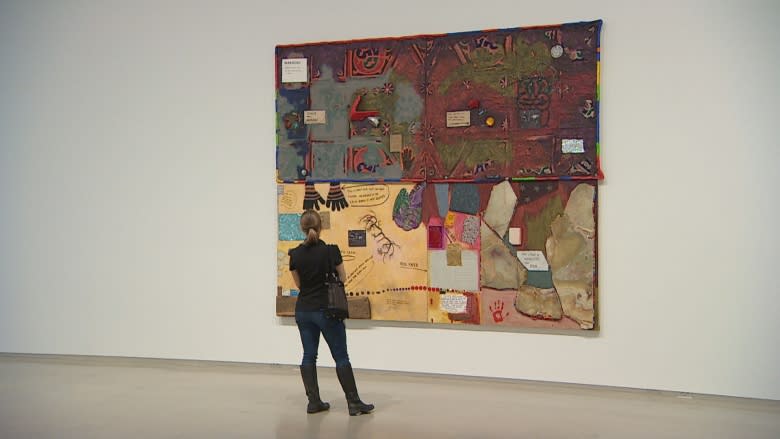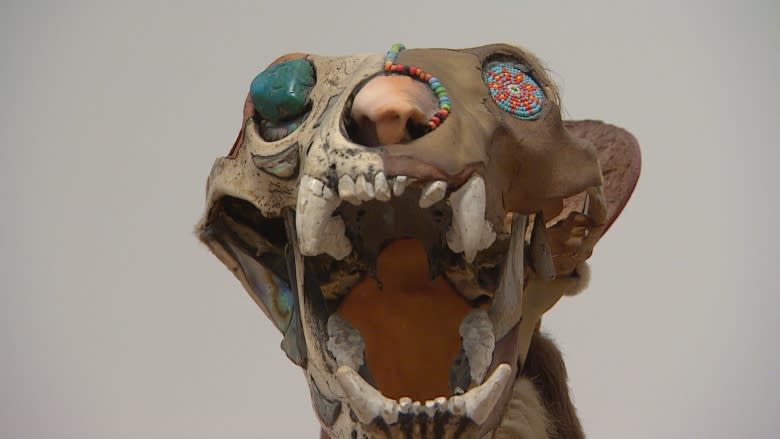Remai Modern defends artist whose Indigenous heritage has been questioned
The Remai Modern's director is defending the decision to feature a retrospective of Jimmie Durham's work. The world-renowned artist self-identifies as a Cherokee, but his heritage has been questioned.
Much of Durham's work depicts Native American themes and uses materials often found in Indigenous work, like wood and bone, metals, and beads.
"He's on record as saying he self-identifies as being Cherokee," said Gregory Burke, director of the Saskatoon art gallery. "The issue there, of course, is that it's not up to Remai Modern to declare his identity. What he has said, though, is that his work is not about his own identity. He's commenting on other people's perceptions of the world."
Anne Ellegood, the curator of the exhibition, said she considers Durham to be an important artist reflecting on the American experience.
She knew about the controversy surrounding his heritage before she started putting together the exhibition.
"He understands himself to be part of Cherokee heritage," she said. "He was raised with the understanding that he has a Cherokee background from his parents and he grew up with that as an understanding, and he has lived his life as an Indigenous person, as a Cherokee.
"I very much, obviously, believe that he is Cherokee and he was raised with that understanding."
Cultural appropriation
Artist Audrey Dreaver teaches Native art history at First Nations University of Canada, and does consulting work with museums and art organizations.
She's critical of the choice to bring the exhibit to Saskatoon, and calls the work cultural appropriation because the Cherokee nation has said they don't claim Durham.
"A major component of the work that he's done and the work that they're looking at as a retrospective is connected to his claims as a Cherokee person."
Although Burke has not said Durham is Cherokee, Dreaver said the gallery's presentation of the exhibit makes a connection to Indigenous art.
"He's got the Indigenous community in Saskatoon to support him, and that's really disappointing," she said. "In doing so, these people that are supporting Durham's exhibit, I don't believe are supporting the voices of the Cherokee nation."
She has been following the exhibit as it toured in the U.S. recently, and said there have been complaints from the Cherokee nation and Native American artists throughout its tour.
"The voices are not being heard. They're not being listened to. When is that going to stop?"
'It's a work of fiction'
David Garneau is an artist and an associate professor in the visual arts department at the University of Regina.
He disagrees with Burke's claim that identity isn't the main point of the exhibition.
"It is the main thing. The whole show is entirely about identity, as a human being, as an American, but in many cases as a Native person."
Garneau said he has followed the artist's work for many years, and enjoyed an exhibition he saw before he knew about the doubts surrounding Durham's heritage. But the controversy has changed the way he views the art.
"Now when I look at his representations that claim to be of Native people, I see a white person making claims, so it's a work of fiction rather than a rapportage of the particular experience humans had," Garneau said.
"But ... if he honestly believes he's Cherokee, if he was born and raised to believe that, then I have nothing to say against it, and that's a problem between him and Cherokee people."
Legal definitions in the States
In June 2017, a collection of 10 Cherokee leaders wrote a letter to Indian Country Today saying Durham is "neither enrolled nor eligible for citizenship in any of the three federally-recognized and historical Cherokee Tribes."
To be considered legally Native American in the States, you must self-declare, be able to prove your Indigenous lineage, and have a recognized tribe claim you, said Garneau.
"Within the Indigenous art world, and the legal world in the United States, he's not an Indigenous person, he's not a First Nations person, he's not an Indian, and that's pretty significant."
Durham's heritage has been questioned since 1990 when the Indian Arts and Crafts Act was passed in the U.S., which requires Native American artists to be a member of State-recognized Indian Tribes.
While Durham claims Cherokee heritage, he does not dispute that he is not a member of an official American Indian Tribe.
In a letter to the editor of Art in America in 1993, Durham wrote, "I am not Cherokee. I am not an American Indian. This is in concurrence with recent U.S. legislation, because I am not enrolled on any reservation or in any American Indian community."
Ellegood will be hosting a public talk about the exhibition on Sunday at 2 p.m. CST.
The exhibit runs March 25 to Aug. 12.




